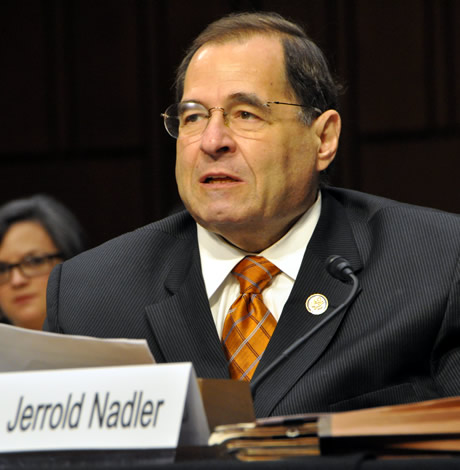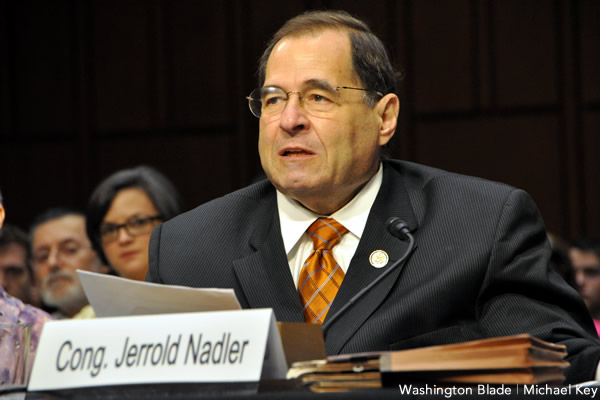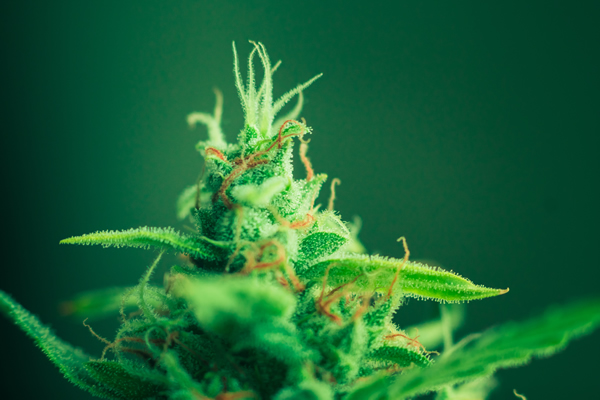Cannabis Culture
Cannabis Culture
Nadler, Harris seek to end federal cannabis prohibition


Nadler, Harris seek to end federal cannabis prohibition
Rep. Jerry Nadler (D-N.Y.), chair of the House Judiciary Committee and Sen. Kamala Harris (D-Calif.) last week introduced comprehensive legislation (The Marijuana Opportunity, Reinvestment, and Expungement Act) to end federal marijuana criminalization.
The Act removes the marijuana plant from the federal Controlled Substances Act, requires the federal courts to expunge prior marijuana-related convictions, and provides grants to communities that have been disproportionately impacted by the drug war, among other changes.
“The MORE Act is the most comprehensive marijuana reform bill ever introduced in the U.S. Congress and is backed by a broad coalition of civil rights, criminal justice, drug policy, and immigration groups,” said NORML Political Director Justin Strekal, who assisted Nadler’s office in drafting the bill. “It embodies the need to legalize cannabis and restore the rights of those who have suffered under the cruel and failed policy of criminalization.”
Added NORML Executive Director Erik Altieri: “By passing the MORE Act, Congress can begin to remedy the pain caused by the criminalization of marijuana. This bill provides a real federal solution by fully de-scheduling of cannabis from the Controlled Substances Act and providing relief to those suffering under the collateral consequences of having a marijuana charge on their record by facilitating the process of expungements. The American public is overwhelmingly ready to legalize marijuana, their elected officials in Washington need to finally start representing the will of the people and advance this sensible legislation.”
6 in 10 Americans back legalizing cannabis: poll
POUGHKEEPSIE,, N.Y. — More than six in 10 U.S. adults endorse cannabis legalization, according to nationwide polling data compiled by The Marist Institute for Public Opinion, in partnership with National Public Radio and the PBS News Hour.
Sixty-three percent of respondents said that it is a “good idea” to “legalize marijuana nationwide.” The issue received greater public support than did numerous other policy questions, including raising the national minimum wage to $15 (56 percent support), imposing a ‘wealth tax’ on those with incomes above $1 million (62 percent), and banning the sale of automatic weapons (57 percent).
“As Americans learn more about the successful legalization of marijuana in state after state, their support for the policy at a national level continues to grow,” said NORML Political Director Justin Strekal. “Even House Judiciary Committee members on both sides of the political aisle have concluded that it is time to end the federal prohibition of cannabis.”
The results are similar to those of a nationwide Axios poll, released in June, which also reported that 63 percent of adults back legalization. Recently compiled polls by Gallup (66 percent), Pew (62 percent), and the Center for American Progress (68 percent), among others, show similar levels of national support
Marijuana arrests soar in Virginia
RICHMOND, Va. — The number of marijuana-related arrests in 2018 climbed to nearly 29,000 — a total that is three times higher than 1999 totals, according to crime data compiled by the Virginia State Police.
Marijuana-related arrests in Virginia have risen steadily in recent years, increasing an estimated 25 percent since 2016. The overwhelming majority of arrests are for possess-related offenses, and over half of those arrested are under 24 years of age.
“Voter attitudes are no longer reflected in state law,” says NORML’s Jenn Michelle Pedini, executive director of Virginia NORML. “Marijuana arrests in Virginia have skyrocketed to a 20-year high, and in stark contrast to the year-over-year national trend downward. The Commonwealth now spends over $100 million annually enforcing marijuana prohibition, at a time when over three quarters of Virginians favor fines not crimes for simple possession and six in 10 support legalizing and regulating responsible adult-use.”
Virginia Attorney General Mark Herring agrees.
“While other states are moving to a more sensible approach to cannabis, Virginia is still moving in the wrong direction. It makes absolutely no sense,” said Herring. “Marijuana arrests are now at their highest level in at least two decades and maybe ever, meaning that even more Virginians, especially young people and people of color, are being saddled with criminal records that can drastically affect their lives. Now is the time to put a stop to this costly, unfair, and ineffective approach, and to pursue a better, smarter, fairer course.”
Under state law, first-time possession offenders face up to 30 days in jail and a criminal record. Subsequent offenses are punishable by up to one year in prison.
Senate legislation introduced earlier this year to decriminalize low-level marijuana possession offenses was rejected by members of the Senate Courts of Justice Committee – with all Republicans voting against the measure. House companion legislation was similarly rejected along party lines.
Cannabis Culture news in the Blade is provided in partnership with NORML. Visit norml.org for more information.

Democratic Gov. Michelle Lujan Grisham earlier this month signed two separate measures into law amending the state’s marijuana policies. The first measure (House Bill 2) legalizes and regulates marijuana possession, production, and sales for adults. The second measure (Senate Bill 2) facilitates the automatic review and expungement of the records of those convicted of low-level marijuana offenses.
Lawmakers approved both bills during a special legislative session demanded by Gov. Lujan Grisham, who had been a vocal proponent of the reforms.
NORML State Policies Manager Carly Wolf said: “This is a day to celebrate! New Mexico will greatly benefit from this new revenue stream and the creation of thousands of jobs. Most notably though, legalization will spare thousands of otherwise law-abiding residents from arrest and a criminal record, and the state’s new expungement law will help provide relief to many who are suffering from the stigma and other collateral consequences associated with a prior marijuana conviction.”
The adult-use measure (House Bill 2) permits those ages 21 and older to legally purchase up to two ounces of marijuana and/or up to 16 grams of cannabis extract from licensed retailers. It also permits adults to home-cultivate up to six mature plants for their own personal use. Retail sales would begin by April 2022.
The expungement measure (Senate Bill 2) stipulates that those with past convictions for offenses made legal under this act are eligible for automatic expungement of their records. Those currently incarcerated for such offenses are eligible for a dismissal of their sentence. It’s estimated that over 150,000 New Mexico residents are eligible for automatic expungement under this measure, according to the Department of Public Safety.
Cannabis Culture news in the Blade is provided in partnership with NORML. Visit norml.org for more information.
Cannabis Culture
Delaware cannabis activists take on corporate marijuana
Criticism from medical marijuana operators claimed that HB150 offers too many cultivation and retail licenses

As the country moves forward with sweeping changes in cannabis policy reform, locals in Delaware are tangling with corporate, multi-state medical marijuana permit holders to pass a bill for full legalization.
Adult-use activists and registered medical patients were stunned to hear opposing testimony from Delaware’s medical marijuana operators. Patients already deal with limited access and costly products. Now, many see the established industry voicing opposition as simply obstructing the progress of adult-use legislation. In response, some patients are now staging a boycott of the regulated dispensaries.
During the first committee hearing for HB150, Delaware’s adult-use bill, four of the state’s six currently licensed, multi-million dollar medical cannabis facilities offered negative testimony.
Zoë Patchell, executive director of Delaware CAN responded: “This market belongs to the long-time consumers, patients, and activists. We create the demand, we’ve been the ones driving the reform efforts, and we pay the prices at dispensaries. Cannabis is more than a market – cannabis is a community. These companies cannot reasonably fathom that we are going to purchase cannabis from any entity that has proven to put profits over patients. And now they seem willing to put consumers’ lives and freedom at risk just to hold out for an unfair advantage in the industry.”
These included publicly traded Columbia Care, “Fresh Delaware” aka CCRI, CannTech Research Inc., and the owner of EZY Venture aka “The Farm.”
They all went on record condemning HB150, and pushing a false narrative about oversupply. The core demand from the permit cartel was some protection for their private business interests with guaranteed adult-use licenses.
Criticism from the medical marijuana operators claimed that HB150 offers too many new cultivation and retail licenses, underlined by deep yet unfounded fears that the new competition would put their companies out of business.
Patchell noted, “We are not going to sit back while multi-state corporate entities, that already monopolize East Coast medical markets, work to undermine our social equity and micro-license provisions.”
Cannabis Culture news in the Blade is provided in partnership with NORML. Visit norml.org for more information.
Cannabis Culture
Virginia marijuana legalization takes effect July 1
Adult possession of cannabis up to one ounce without penalty

Following legislative approval of Democratic Gov. Ralph Northam’s amendments to Senate Bill 1406 and House Bill 2312, Virginia became the first southern state to legalize the possession and use of marijuana by adults.
Senate Bill 1406, introduced by Sen. Adam Ebbin (D-30) and Senate President Pro Tempore Senator Louise Lucas (D-18), and House Bill 2312, patroned by House Majority Leader Delegate Charniele Herring (D-46), establish a statutory timeline for the legalization of the commercial marijuana market in Virginia. The measure also permits for the personal possession and cultivation of cannabis by those ages 21 or older.
Last week, Gov. Northam recommended changes to the legislation to permit the personal use provisions of the law to take effect on July 1, 2021 rather than on January 1, 2024, the enactment date initially approved by lawmakers. A majority of the legislature concurred with that change.
Therefore, beginning July 1, 2021, adults will be permitted to possess up to one ounce of marijuana and to cultivate up to four cannabis plants per household without penalty.
The timeline by which state regulators have to enact provisions licensing commercial cannabis production and sales remains July 1, 2024.
Commenting on final passage, NORML Development Director Jenn Michelle Pedini, who also serves as executive director of Virginia NORML, said: “This is an incredible victory for Virginia. Legalization will bring an end to the thousands of low-level marijuana infractions occurring annually in the Commonwealth — ending a discriminatory practice that far too often targets Virginians who are young, poor, and people of color.”
Majority Leader Charniele Herring added: “It is a huge day for equity in the Commonwealth. Virginia is now the first state in the South to legalize recreational marijuana use, and I am so proud to have been able to carry this monumental legislation.”
Sen. Ebbin said, “The passage of SB1406 caps off years of struggle to reform our broken and outdated marijuana laws and begins the deliberate steps to repeal the harms of the failed prohibition. I am thankful to NORML, the governor, and my colleagues for moving this 283 bill from inception to passage over the last four months, and look forward to continuing to partner with them to establish a regulated, equity focused, adult-use marketplace in the coming years.”
Newly released statewide polling data finds that 68 percent of registered voters in Virginia, including majorities of Democrats and Republicans, support legalizing marijuana for adults.
Additional amendments added by Gov. Northam will allow the sealing of records related to crimes involving the misdemeanor possession of marijuana with the intent to distribute. Those records will begin to be sealed starting on July 1, 2021. Separate legislation enacted in 2020 previously sealed records related to misdemeanor marijuana possession.
Records specific to the simple possession of marijuana and/or misdemeanor possession with intent to distribute records will be automatically expunged no later than 2025. Those with records specific to crimes involving the felony possession of marijuana with the intent to distribute may begin to petition the courts for an expounging of their records in 2025.
The bill also allows for the re-sentencing of individuals currently incarcerated for marijuana-related offenses. The measure permits those individuals to have a hearing before the court that originally sentenced them, with legal counsel provided for indigent individuals. However, this portion of the bill must be reenacted in 2022.
The legislation also establishes an independent agency, the Virginia Cannabis Control Authority, to oversee the establishment of regulations that will govern the adult-use market. This agency is set to convene this summer. The remainder of the 300-page bill, which details the regulatory and market structure and social equity provisions, is subject to a second review and vote by the Assembly next year.
Cannabis Culture news in the Blade is provided in partnership with NORML. Visit norml.org for more information.
-

 The Vatican17 hours ago
The Vatican17 hours agoAmerican cardinal chosen as next pope
-

 a&e features23 hours ago
a&e features23 hours agoYour guide to the many Pride celebrations in D.C. region
-

 U.S. Supreme Court3 days ago
U.S. Supreme Court3 days agoSupreme Court allows Trump admin to enforce trans military ban
-

 District of Columbia2 days ago
District of Columbia2 days agoWorldPride permits for National Mall have yet to be approved









